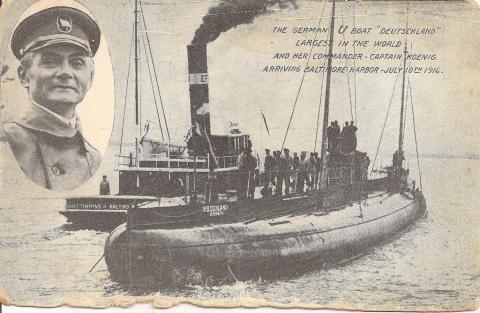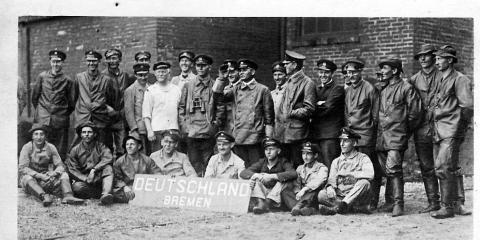The submarine Deutschland makes surprise visit to America!
 The German U-boat "Deutschland", the largest in the world, and her commander Captain Koenig arriving in Baltimore Harbor - July 10th, 1916, here being escorted by a tug. See a short video of the arrival
The German U-boat "Deutschland", the largest in the world, and her commander Captain Koenig arriving in Baltimore Harbor - July 10th, 1916, here being escorted by a tug. See a short video of the arrival
vol. 4 no. 24 July 19, 1916 Page 8
Behind the Scenes at the Capital
Washington, D. C., July 11—It will do no harm to keep an eye on the State Department in connection with the submarine Deutschland, which arrived at Baltimore on Sunday. This feat of German seamanship has created something like consternation in Administration circles, and it will be a wonder, as one member of Congress pointed out to me, if the vessel is not subjected to some form of diplomatic chicanery in the hope of removing it as a factor in showing the British blockade of Germany to be in very truth “ineffective, illegal and indefensible.”
It is as yet too soon to say what the policy of the Administration will be. There has not been time to hear from London. Several times the Administration has made an impulsive start to follow an American line of thought—as when [Sec of State] Lansing proceeded to recognize the legitimate character of the submarine warfare—only to be overruled from London and to convert its independent attitude into one of sevile accommodation to the British policies. […] The feat is universally regarded as the greatest achievement since the voyage of Columbus, and its effects, in the opinion of members of Congress, will be of the most far-reaching kind.
On the face, it is a defeat for Great Britain. She must either knuckle down to a new condition of undreamed-of possibilities, or blockade the American ports in order to prevent the ingress and egress of these vessels. If Britain blockades an American port it will be up to the Administration to decide whether it is an actual ally of the Allies or whether the American rule that British war vessels must keep away from American ports is to be vigorously asserted. For this reason alone the arrival of the German submarine is causing the White House and State Department no end of worry.
* * * *
EDITORIALS
“HAIL DEUTSCHLAND”
The arrival of the super-submarine is Germany's heroic reply to England's repudiation of the Declaration of London. The United States is also a party to that basic recital of international law on the highways of the deep. Would to God that the response of our government to the lawless act of the Allies will be no less inspiring. The matchless achievement of German courage and German efficiency quickens the heart of every German throughout the world. Loyal Americans hope that when the protest of the United States against the denial of our rights as a sovereign and a neutral is dispatched to Paris and London, we shall have reason to be equally proud of our own government.
Crew of the Deutschland in Baltimore, 1916. Click to enlarge
Not all the armadas of Great Britain can debar Germany from her place among nations. What power can defeat a people who combine the vision of the dreamer with the strength of the warrior and the skill of the engineer? The Allies have attempted to parody Germany's national anthem. To “Deutschland ueber alles” they scoffingly opposed their own maxim: “Deutschland unter alles.”
Germany heard and turned ridicule into triumph. Not contented with smashing English dreadnoughts at Skagerrack on the surface of the sea, her submarines dive at their leisure under the entire British navy. If England rules all over the waves, Germany unquestionably rules all under the waves. To her who has wrested the Trident from Neptune under the billows, no navy in the world can indefinitely deny her legitimate share of maritime power on the face of the seven seas.
If England's illegal blockade persists, Germany will break it. She will break it over the sea and under the sea. We look for the immediate inauguration of a submarine traffic and passenger service. The submarine merchant marine, so as to give no excuse for British assaults, will be unarmed. In the beginning the submarine merchantman will carry few passengers, and only the most precious of cargoes. If the war should last much longer, sub-Atlantic ocean liners of the size of the Vaterland will carry the mails and the cargoes of the Central Powers across the seas.
At this writing huge amounts of dyestuffs, of which our manufacturers are sorely in need, rest idly in neutral wharves because England has withdrawn her permission for these harmless non-contraband goods to be shipped to us, even though many of our industries perish. The sub-Atlantic merchant marine will carry these treasures to our shores. Yet we cannot disguise a feeling of humiliation in the face of such dauntless courage. Where we protest in ineffectual words, Germany acts.
Our complaisant attitude is hardly in accordance with Yankee traditions. We are not one of the nations at war. We should not need the protection of the submarine to carry our innocent mails to any part of the globe. We should be able to help ourselves. We should not be compelled to rely upon Germany, beset by enemies on every side, to secure for the American flag the freedom of the seas.
The Germans have been called a nation of poets and thinkers. They still are a nation of poets and thinkers: where England clings to the surface, Germany penetrates to the depths and rises to the heights. The transatlantic submarine traversing thousands of leagues under water and the Zeppelin rising thousands of feet into the air, are supreme vindications of German culture. Wherever our sympathies lie, we cannot but exult in the brilliant dash of Captain Koenig and his courageous crew: it marks a new chapter in the history of the world and the history of the sea. -GEORGE SYLVESTER VIERECK
______________________
vol. 4 no. 25 July 26, 1916 Page 10
EDITORIALS
THE SUBMARINE MERCHANTMAN
The State Department has decided that the Deutschland is a merchantman. It could hardly have decided otherwise. […]
If the submarine Deutschland is a merchantman within the three-mile limit she cannot suddenly change her status the moment she leaves our territorial waters. She is a merchantman on the high seas no less than in harbor. As Dr. von Jagow remarks in an interview with Dr. William Bayard Hale:
“We claim nothing for this new type of merchantman save that she is entitled to be hailed, visited and the crew placed in safety before she is destroyed—the precise rights which have been insisted upon for every other merchant ship by your Government.
“If, after she is hailed, she attempts to escape, she does so at her own risk, and may properly be attacked and sunk. But to allow the attack without warning upon an unarmed, fragile boat, with the lives of the crew at the mercy of a single shot, that is something of which we refuse to believe the United States is capable.
“While the Deutschland is purely a commercial enterprise, the German Government is naturally watching with a high degree of interest the treatment accorded her by the Government of the United States ...”
If the Allied cruisers should attack the Deutschland without warning, the Administration would be in honor bound to dispatch an immediate ultimatum to Paris and London. […] Any other course of action would expose our boasted neutrality as the rankest hypocrisy. It would prove that we have no interest in protecting merchantmen, but that our sole interest lies in the protection of British merchantmen.
[…]
The Allies declare that if they fail to sink the Deutschland, they will proceed against every American merchant who sells supplies to Germany and drive him out of business. According to late dispatches over seventy American firms have been placed officially on the British blacklist. We have before this unavailingly called the attention of the Department of Justice—which deserves to be called the Department of Injustice rather—to the fact that the trade agreements of the Rubber Club of America as well as the agreement entered into between the various copper companies and the British Government are distinct violations of the Sherman Anti-Trust Law and the Clayton Act. Will the Department of Justice—after tacitly conniving in these illegal arrangements—permit the impudent threat of the British Embassy against American firms doing business with Germany to stand unchallenged? [...]
* * * *
BLUNDERING AT SAYVILLE
We invite the attention of the Committee on Foreign Relations to the fact that the United States authorities in charge of the Sayville [wireless] Station have refused to pass not only Captain Koenig's answers to messages of congratulation received from Germany, but also the comments of the American press on the marvelous achievement of the dauntless submarine merchantman Deutschland. An inquiry ought to be made upon the basis of what extraordinary regulations so serious a blunder was possible. Of what avail are the attempts of the two governments to restore confidence and good faith in the relations between the two countries if subordinates, bound perhaps by unintelligent and unfair restrictions, have it in their power to bring such efforts to naught? Nothing could serve better to restore German confidence in the fairness of the American people than a review of the royal welcome extended by this country to Captain Koenig and to his crew. The blundering action of the censor not only destroys this golden opportunity, but it again forcibly reminds the German people and the German sympathizers throughout the world of the unfair discrimination shown by imposing a censorship on the German wireless while permitting free play to the English cable. [...]
Category
Historical Revisionism, The Fatherland, World War 1- 1197 reads










